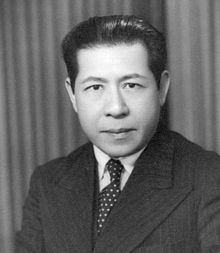Chen Gongbo
| Chen Gongbo 陳公博 |
|
|---|---|
 |
|
|
President of Republic of China (Nanjing regime) |
|
|
In office September 1944 – August 1945 |
|
| Vice President | Zhou Fohai |
| Preceded by | Wang Jingwei |
| Succeeded by | Office Abolished |
| Mayor of Shanghai | |
|
In office November 1940 – December 1944 |
|
| Preceded by | Yu Hung-chun |
| Succeeded by | Zhou Fohai |
| Personal details | |
| Born |
October 19, 1892 Northern Guangdong, Qing Empire |
| Died | June 3, 1946 (aged 53) Suzhou, Jiangsu, Republic of China |
| Political party | Communist Party of China, Kuomintang |
| Alma mater |
Beijing University Columbia University |
Chen Gongbo (Chinese: 陳公博; Wade–Giles: Ch'en Kung-po; Japanese: Chin Kōhaku, October 19, 1892 – June 3, 1946) was a Chinese politician, noted for his role as second (and final) President of the collaborationist pro-Japanese Nanjing Nationalist Government during World War II.
Chen Gongbo was born in Guangzhou (Canton), Qing Empire in 1892. His father was an official in the Qing Dynasty administration. As a student at Beijing University, he participated in the May Fourth Movement and studied Marxism under Chen Duxiu. Chen Gongbo was one of the founders of the Chinese Communist Party and a member of its First Congress in Shanghai in July 1921, but left the party the following year. He then moved to the United States, where he obtained a master's degree in Economics at Columbia University in 1925. On his return to China he joined the Kuomintang (KMT) and was named head of the Department of Peasants and Workers under Liao Zhongkai, and was considered a member of the KMT leftist clique together with Wang Jingwei, with whom he developed a close political and personal relationship. Although he played a significant role in Chiang Kai-shek’s Northern Expedition, he—along with Wang Jingwei—strongly opposed Chiang as Chiang began to exercise dictatorial power. He felt it particularly unfair for Chiang to have replaced Wang in KMT leadership through a military coup in 1926. However, during a period of Chiang-Wang cooperation, he was named Minister of Industry by the Kuomintang government from 1932-36. Some of the fundamental national economic policies he helped set in this period remained in practice under various Chinese political regimes until the 1970s. As director of the Kuomintang Sichuan branch, he helped organize the evacuation of the Kuomintang government to Chongqing after the start of the Second Sino-Japanese War.
...
Wikipedia
